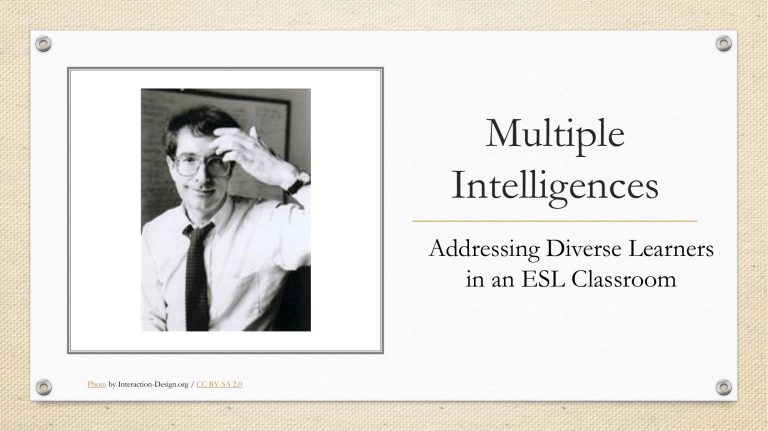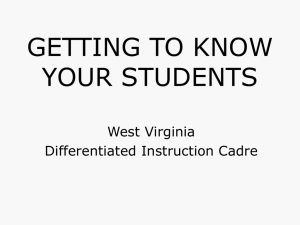
Multiple Intelligences Addressing Diverse Learners in an ESL Classroom Photo by Interaction-Design.org / CC BY-SA 2.0 • • • • Contents Objectives Howard Gardner’s Theory of Intelligence Literature Review Multiple Intelligences Theory and Second Language Learning • Integration of Multiple Intelligences Theory in ESL Classes • Issues and Recommendations • Conclusion Objectives Importance of multiple intelligences in second language learning Learners have individual differences and learning styles Different approaches for varied intelligences and learning preferences Howard Gardner’s Theory of Multiple Intelligences • No one approach to measure intelligence • Learners possess different intelligences • Apply varied approaches to interpret information & solve problems • Approaches should be student centered • Students taught by multiple intelligences approach show positive attitude levels "Anything that is worth teaching can be presented in many different ways. These multiple ways can make use of our multiple intelligences." Howard Gardner Literature Review Howard Gardner’s Theory of Multiple Intelligences Multiple Intelligences Theory and Second Language learning Linguistic Intelligence • a person’s ability to use language effectively, both oral and written Activities • • • • • Storytelling, Writing a short poem, debates, Group discussions, Gap fills, Conducting interviews, word games. Visual – Spatial Intelligence Ability to imagine and form pictures and transform them into visual ideas & expressions Activities – • • • • • Describing pictures, Using visual images for teaching vocabulary, Video exercises & multimedia projects, Using charts & maps, Graphics analyzers and concept maps. Logical Mathematical Intelligence Good at using numbers, solving problems enjoy facing new challenges in life Activities - • • • • • Concept mapping, Flow charts, Sequencing events in chronological order, Word-order activities, pattern games, Jigsaw puzzles. Musical Intelligence Sensitivity to music rhythm and tone Activities • • • • Playing songs, Musical cloze activities, Singing a song or rap Making presentations using sound or music & tongue twisters. Bodily Kinesthetic Intelligence using part or the entire body in solving a problem, performing a task Activities • Planning & attending a field trip, • Role plays, miming, dancing, • Building models and grammar games Interpersonal Intelligence Empathizing with others Activities - • • • • • Conducting a meeting Group work, Practice giving and receiving feedback Surveys and polls Group brainstorming. Intrapersonal Intelligence Ability to self-introspect about our abilities, emotions, feelings & appreciate ourselves Activities • Writing journal entries, • Activities involving self- reflection & sharing personal experiences, • Assessing one’s work • Setting and pursuing a goal. Naturalistic Intelligence our abilities and skills to observe, recognize, analyze the natural world that includes, flora and fauna • Learning vocabulary - exploring outdoors but in English • Shopping and other field trips • Collecting plants to learn appropriate vocabulary • Field trips to museums • Involvement in environment protection projects Existential Intelligence our sensitivity to our existence, asking questions about our life and where have we originated from and where do we go? • Cultural lessons on different societies • Contemplating different religious beliefs but with a reasoning • Thought provoking activities on challenges and consequences of lifestyle choices. Integration of Multiple Intelligence in ESL Classes – Learning Styles Language in Action – • young learners love to sing and dance • let them create their rhymes with helpful words. • rhymes could be replaced by songs with adult learners Drawing and Coloring Alternatives to Music – • can draw characters from stories • make interesting, picturesque folders, • bookmarks, and posters for their classes Drama in Action – • young learners love action in classrooms • enacting the characters • involves all four skills of language • students create their characters • write their lines and speak them while enacting the play Games for Fun – • make their games on stories or characters • create card games and play in pairs or groups • digital games like ‘Kahoot’ – for teaching skills, language, vocabulary, and grammar. Handicrafts for creativity and learning Storybooks for inspiration • best way to introduce a foreign language • create interesting artwork • can enact, draw, sing to fairytales • craftwork based on characters in their plays • create small objects like hats, masks, and bookmarks, etc. Jokes for fun and laughter – Vocabulary building exercises – • young learners love to laugh • build picture dictionaries or ‘Pictionary.’ • learners can enact jokes, • compose songs, create • write entire poems, stories in a • characters that narrate the • highlight new words in the story puppets jokes to class. colorful manner or the poem Few tests available to test the learners’ intelligences Cultures believe in different intelligences Adding more activities can be overwhelming May need some prior experience Wide variety of evaluation criteria needed to assess diverse profiles. Teachers would need some training workshops Issues & Recommendations Recommendations • Results in high performance levels in ESL classes. • Careful planning and analyzing can help teachers structure their lesson plans • Training and workshops needed to guide teachers • Teachers need to use various forms of assessments to do justice • Debates, role plays, projects and presentations to provide incentive to such learners. Conclusion • Multiple Intelligences theory has more benefits than limitations. • An opportunity to introspect and analyze on their capabilities • A paradigm shift in their experiences - can create more learner-centered classes • Educators can raise the level of linguistic skills of their learners. • It develops their communicative skills. • A great potential to bring out the best in both the educators as well as learners.



